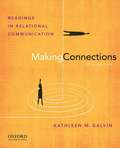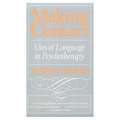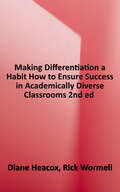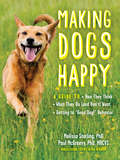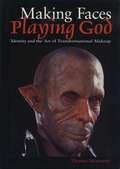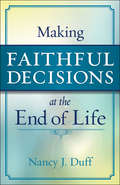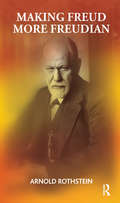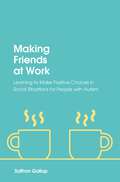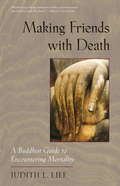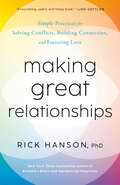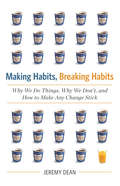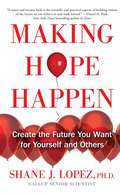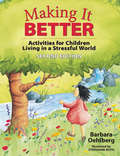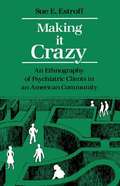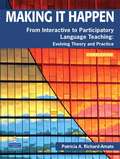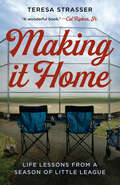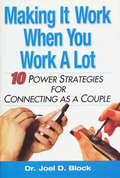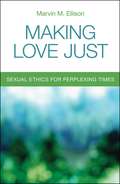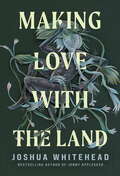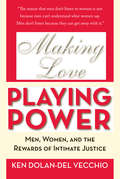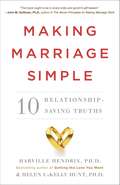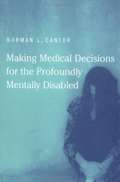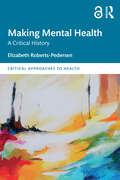- Table View
- List View
Making Connections: Readings in Relational Communication
by Kathleen GalvinMaking Connections: Readings in Relational Communication, Fifth Edition, is a unique collection of readings that provides a balanced, timely, and challenging set of perspectives on relational communication. Edited by Kathleen M. Galvin, the volume includes diverse selections from the recent work of top communication scholars and teachers, offering a balance between humanistic and social-science perspectives. Each reading exposes students to the latest developments in the ever-changing field of interpersonal communication.
Making Contact: Uses of Language in Psychotherapy
by Leston HavensSince 1955, moving from early work in psychopharmacology to studies of clinical method and the psychiatric schools, Leston Havens has been working toward a general theory of therapy. It often seems that twentieth-century psychiatry, sect-ridden, is a Tower of Babel, as Havens once characterized it. This book is the distillation of long years of thought and practice, a bold yet modest attempt to delineate an “integrated psychotherapy. ” The boldness of this effort lies in its author’s willingness to recognize the best that each school has to offer, to describe it cogently, and to integrate it into a full response to today’s new kind of patient. Descriptive or medical psychiatry, psychoanalysis, interpersonal or behavioristic psychiatry, empathic or existential therapy-viewed in metaphors, respectively, of perceiving, thinking, managing, feeling-all have useful contributions to make to contemporary methods of treatment. But how? Havens’s modest answer is through appropriate language, and he demonstrates exactly what he means: when to ask questions, when to direct or draw back, when to sympathize. Practitioners now must deal with less dramatic, but more stubborn, problems of character and situation; lack of purpose, isolation, submissiveness, invasiveness, deep yet vague dissatisfaction. Some kind of human presence must be discovered in the patient, and Havens gives concrete, absorbing examples of ways of “speaking to absence,” of making contact. The emphasis is on verbal technique, but the underlying broad, humane intent is everywhere evident. It is no less than to transform passivity, by means of disciplined therapeutic concern, into a state of being Human.
Making Decisions That Matter: How People Face Important Life Choices
by Kathleen M. GalottiResearchers studying decision making have traditionally studied the phenomenon in the laboratory, with hypothetical decisions that may or may not involve the decision maker's values, passions, or areas of expertise. The assumption is that the findings of these well-controlled laboratory studies will shed light on the important decisions people make in their everyday lives. This book examines that assumption. The volume begins by covering four basic phases of decision making: setting or clarifying goals, gathering information, structuring the decision, and making a final choice. Comprehensive reviews of existing literature on each of these topics is provided. Next, the author examines differences in decision making as a function of several factors not typically discussed in the literature: the type of decision being made (e.g., legal, medical, moral) and the existence of individual differences in the decision maker (developmental differences, individual differences in style or temperament, differences as a function of expertise). The author then examines the topic of group decision making, contrasting it with individual decision making. The volume concludes with some observations and suggestions for improving peoples' everyday decision making. This book is intended for use as a core textbook or supplement for courses in psychology, education, or allied disciplines. It will also be an invaluable resource for people who work with people making decisions in various applied settings, such as schools, universities, and health care centers.
Making Differentiation a Habit: How to Ensure Success in Academically Diverse Classrooms (Free Spirit Professional® Ser.)
by Diane HeacoxThis updated edition of a popular resource helps teachers seamlessly integrate differentiation practices into their daily routines. In this updated edition of her guide to daily differentiated instruction, Diane Heacox outlines the critical elements for success in today’s classrooms. She gives educators evidence-based differentiation strategies and user-friendly tools to optimize teaching, learning, and assessment for all students. New features include an expanded section on grading, information on connections between personalized learning and differentiation, integration of strategies with tier one instructional interventions, scaffolding strategies, revised planning templates, and updated resources, which include digital tools and apps for assessment. Digital content includes customizable forms from the book.
Making Dogs Happy: A Guide to How They Think, What They Do (and Don't) Want, and Getting to "Good Dog!" Behavior
by Paul McGreevy Melissa StarlingLearn to decode your dog&’s emotions and behaviors—and be the best dog parent you can be—with this guide by two leading experts in canine behavior. &“Why does my dog do that?&” is a question every dog owner has asked, whether their best friend is growling at an unseen foe, or rolling in something that smells terrible. In Making Dogs Happy, dog trainer Melissa Starling and veterinarian Paul McGreevy supply all the answers: How dogs use body language to communicate (with both people and other dogs)What motivates dogs (and what doesn&’t)Rules for canine contentment (for example, most dogs don&’t enjoy hugging)Subtle signs of discomfort, stress, and fear (like lip licking)And even how to choose the furry companion that&’s right for you. In Making Dogs Happy, you&’ll learn to see the world as your dog does—full of goals to pursue, resources to guard, and stressors to avoid. Using that knowledge, you&’ll be able to communicate with and train your dogs—and keep them happy.
Making Early Medieval Societies
by Kate Cooper Conrad Leyser Cooper, Kate and Leyser, ConradMaking Early Medieval Societies explores a fundamental question: what held the small- and large-scale communities of the late Roman and early medieval West together, at a time when the world seemed to be falling apart? Historians and anthropologists have traditionally asked parallel questions about the rise and fall of empires and how societies create a sense of belonging and social order in the absence of strong governmental institutions. This book draws on classic and more recent anthropologists' work to consider dispute settlement and conflict management during and after the end of the Roman Empire. Contributions range across the internecine rivalries of late Roman bishops, the marital disputes of warrior kings, and the tension between religious leaders and the unruly crowds in western Europe after the first millennium - all considering the mechanisms through which conflict could be harnessed as a force for social stability or an engine for social change.
Making Faces, Playing God: Identity and the Art of Transformational Makeup
by Thomas MorawetzWearing a mask-putting on another face-embodies a fundamental human fantasy of inhabiting other bodies and experiencing other lives. In this extensively illustrated book, Thomas Morawetz explores how the creation of transformational makeup for theatre, movies, and television fulfills this fantasy of self-transformation and satisfies the human desire to become "the other. " Morawetz begins by discussing the cultural role of fantasies of transformation and what these fantasies reveal about questions of personal identity. He next turns to professional makeup artists and describes their background, training, careers, and especially the techniques they use to create their art. Then, with numerous before-during-and-after photos of transformational makeups from popular and little-known shows and movies, ads, and artist's demos and portfolios, he reveals the art and imagination that go into six kinds of mask-making-representing demons, depicting aliens, inventing disguises, transforming actors into different (older, heavier, disfigured) versions of themselves, and creating historical or mythological characters.
Making Faithful Decisions at the End of Life
by Nancy DuffBy exploring the ethics of resisting and accepting death from a Christian perspective, Nancy Duff encourages Christians to talk about death in the context of Christian faith. Making Faithful Decisions at the End of Life helps readers use biblical and theological perspectives regarding death to inform end-of-life decisions, consider where they stand on withdrawing life support and supporting death with dignity laws, and take steps in planning for their own future.
Making Freud More Freudian
by Arnold RothsteinThis book demonstrates the clinical value of "making Freud more Freudian". The theoretical contributions of Charles Brenner are summarized and emphasized. They are built on an elaboration of Arlow's "fantasy function" and Freud's "compromise formation". The author applies this theoretical perspective in elaboration of the concepts of narcissism, masochism, shame and guilt to the distinction between psychiatric and psychoanalytic diagnoses, as well as to a variety of specific clinical topics. Finally, the author emphasizes that the ubiquity of unconscious conflict demonstrates that all perceptions are subjective and relationships intersubjective.
Making Friends at Work: Learning to Make Positive Choices in Social Situations for People with Autism
by Saffron GallupMaking new friends at work can be tricky - it's tough to predict how people will react to certain situations. This 'choose your own response' book can show you how these situations could potentially play out. Some endings are positive and some less so, and the book includes explanations about why particular outcomes may have occurred, so you can learn to avoid those situations. The best part is you can go back and see how a different choice can change the outcome of the story!
Making Friends with Death: A Buddhist Guide to Encountering Mortality
by Judith L. LiefIn Making Friends with Death, Buddhist teacher Judith Lief, who's drawn her inspiration from the Tibetan Book of the Dead, shows us that through the powerful combination of contemplation of death and mindfulness practice, we can change how we relate to death, enhance our appreciation of everyday life, and use our developing acceptance of our own vulnerability as a basis for opening to others. She also offers a series of guidelines to help us reconnect with dying persons, whether they are friends or family, clients or patients.Lief highlights the value of relating to the immediacy of death as an ongoing aspect of everyday life by offering readers a variety of practical methods that they can apply to their lives and work. These methods include:Simple mindfulness exercises for deepening awareness of moment-by-moment changePractices for cultivating loving-kindnessHelpful slogans and guidelines for caregivers to useMaking Friends with Death will enlighten anyone interested in coming to terms with their own mortality. More specifically, the contemplative approach presented here offers health professionals, students of death and dying, and people who are helping a dying friend or relative useful guidance and inspiration. It will show them how to ground their actions in awareness and compassion, so that the steps they take in dealing with pain and suffering will be more effective.
Making Great Relationships: Simple Practices for Solving Conflicts, Building Connection, and Fostering Love
by Rick Hanson&“50 simple, powerful ways to improve your relationships at home and at work&” (Lori Gottlieb, author of Maybe You Should Talk To Someone), based on the latest findings in neuroscience, mindfulness, and positive psychology—by the New York Times bestselling author of Neurodharma and ResilientRelationships are usually the most important part of a person&’s life. But they&’re often stressful and frustrating, or simply awkward, distant, and lonely. We feel the weight of things unsaid, needs unmet, conflicts unresolved. It&’s easy to feel stuck. But actually, new research shows that you create your relationships every day with the things you do and say, which gives you the ability to start improving them now. You have the power to make all your relationships better just by making simple changes that start inside yourself. New York Times bestselling author of Buddha&’s Brain and Hardwiring Happiness, Rick Hanson, PhD, brings his trademark warmth and clarity to Making Great Relationships, a comprehensive guide to fostering healthy, effective, and fulfilling relationships of all kinds: at home and at work, with family and friends, and with people who are challenging. As a psychologist, couples and family counselor, husband, and father, Dr. Hanson has learned what makes relationships go badly and what you can do to make them go better. Grounded in brain science and clinical psychology, and informed by contemplative wisdom, Making Great Relationships offers fifty fundamental skills, including: • How to convince yourself that you truly deserve to be treated well• How to communicate effectively in all kinds of settings• How to stay centered so that conflict doesn&’t rattle you so deeply• How to see the good in others (even when they make it difficult)• How to set and maintain healthy boundaries or resize relationships as needed• How to express your needs so that they are more likely to be fulfilled With these fifty simple yet powerful practices, you can handle conflicts, repair misunderstandings, get treated better, deepen a romantic partnership, be at peace with others, and give the love that you have in your heart. Making Great Relationships will teach you how to relate better than ever with all the people in your life.
Making Habits, Breaking Habits: Why We Do Things, Why We Don't, and How to Make Any Change Stick
by Jeremy DeanThe psychologist behind PsyBlog explores the science of habituand how you can change yours for the better
Making Hope Happen: Create the Future You Want for Yourself and Others
by Shane J. LopezHow do some people make good things happen and bounce back from setbacks? Why do they lead happier, healthier, more productive lives? It's because they have hope--not because of luck, or intelligence, or money. So, what exactly is hope and how can you get it, too? Using discoveries from the largest study of hopeful people ever conducted, world-renowned expert on the psychology of hope Shane J. Lopez, Ph.D., reveals that hope is not just an emotion but an essential life tool. Hope is also a leading indicator of success in relationships, academics, career, and business. With Making Hope Happen you can measure your level of hope and learn how to create and share it. In this newest evolution of positive psychology, Dr. Lopez provides strategies for building a high-hope mind-set and shares uplifting stories of real people--parents, educators, entrepreneurs, young and old people with health challenges, and civic leaders-- who create hope and who change their own lives as well as their schools, workplaces, and communities. They include: * The CEO who befriended a curious nine-year-old, bringing him into the company and transforming his attitude toward school and future goals. * A young entrepreneur who worked to change laws that stood in his way, recruited friends to support his start-up, and rebuilt from scratch after a fire. * The college president whose creative fundraising during the worst of the economic downturn kept her neediest seniors in school through graduation. * The city council members who developed a visionary recovery plan only days after their community was flattened by a tornado. * Two mothers and a principal who reversed decades of neglect and mismanagement to turn a failing school into a neighborhood magnet. * A college student who is thriving after two heart transplants, and whose hopeful self-care has been key to her survival. Making Hope Happen is for people who believe that the future can be better than the past or the present and who are looking for a way to make it so. The message is clear: Hope matters. Hope is a choice. Hope can be learned. Hope is contagious.
Making It Better
by Barbara OehlbergMore than 75 empowering and healing classroom activitiesChildren living with uncertainty and insecurity often have difficulty focusing on learning. They might demonstrate disrespectful or defiant behaviors, act out, or act with aggression. As an educator, you may provide the only stability in their otherwise turbulent world.Making It Better explains trauma-informed education, an approach that recognizes the impact of traumatic stress on children and its effect on the growing brain, and applies the latest neurological research to teaching methods, disciplinary policies, and interactions to support grieving children.This book responds to the learning and behavioral needs of children who have experienced traumatic events or toxic stress-such as natural disasters, community violence, or abuse or neglect within the child's familial relations-and includes a collection of activities and strategies to help children heal and feel empowered.Distressed children need absolute emotional security and an opportunity to engage in healing activities. With your help, children can begin to build resiliency and find renewed hope for the future.Barbara Oehlberg, MA, is an education and child trauma consultant who has presented for many organizations throughout the country. With a career that has spanned many levels, Barbara has spent more than 30 years making a positive impact on children's lives.
Making It Crazy: An Ethnography of Psychiatric Clients in an American Community
by Sue E. EstroffEstroff describes a group of chronic psychiatric clients as they attempt life outside a mental hospital.
Making It Happen, from Interactive to Participatory: Language Teaching, Evolving Theory and Practice (4th Edition)
by Patricia A. Richard-AmatoNew to this edition: Separate chapters on implicit/explicit teaching and on a sociocultural/cognitive synthesis. New sections on focus form strategies, World Englishes, research directions, corpus analysis, dialogical assessment, and the Acoma heritage language program. The research has been updated throughout and reflects influential thinking for the 21st century. Part 1: Theoretical Considerations - Explores current theory and research; builds a case for emergent participatory teaching; and highlights literacy development, self-directed learning strategies, and current assessment issues and practices. Part II: Exploring Methods and Activities - Presents a practical reservoir from which teacher can draw as they develop their own methodologies and local practice. Part III: Putting It All Together: Some Practical Issues - Considers issues critical to program development, lesson design, textbook and computer program selection, video use; teacher research and professional development (including SOP). Part IV: Programs in Action - Describes K-Adult Programs (ESL, Foreign Language, Bilingual, and Tribal Heritage). Part V: Case Studies: Teacher Narrations to Stimulate Professional Dialogue - Presents case studies, ranging from kindergarten through university levels.
Making It Home: Life Lessons from a Season of Little League
by Teresa StrasserAn achingly heartfelt and surprisingly funny memoir about family, grief, and moving forward by an award-winning writer and TV personality. When her brother dies from cancer, and then her mother just four months later, Teresa Strasser has no one to mourn with but her irresponsible, cantankerous, trailerpark-dwelling father. He claims not to remember her chaotic childhood, but he&’s a devoted grandpa, so as her son embarks on his first season pitching in Little League, Teresa and Nelson form a grief group of two in beach chairs lined up behind the first base line. There are no therapeutically trained facilitators and no rules other than those dictated by the Little League of America, and the human heart. For Teresa and her father, the stages of grief are the draft, the regular season, and the playoffs. One season of baseball becomes the framework for a memoir about family, loss, and the fundamentals of baseball and life. They cheer, talk smack about other teams, scream at each other in the parking lot, and care way too much about Little League. Making It Home is a bracingly honest journey through grief, self-doubt, and anxiety armed with humor and optimism. After all, America&’s pastime may be just a game, but it always leaves room for redemption, even at the bottom of the lineup.
Making It Work When You Work A Lot: 10 Power Strategies For Connecting As A Couple
by Joel D. BlockA sampling of real-life stories behind the curtain in the executive suite: Marion has a ten-percent marriage. Her husband is on the road eighty percent of the time and catches up on sleep half of the time he is at home. She uses innovative techniques to save her relationship. The neglect and resentment Joyce felt as a result of her husband Paul's extraordinary work schedule was temporarily eased by her fling with a former colleague. She confessed her infidelity to Paul--and they're still together! Learn about repair strategies that are tried and proven. Rob, a stay-at-home dad, also considered having an affair. He's come up with a better solution, one that saved his marriage as well as his ego. Kevin had developed an intriguing method for keeping Janice at a distance. We'll see how Janice reacted and what they did to bring value back to their relationship. Alex badgered Florence about her housekeeping, then acknowledged that his beef was Florence's meteoric career progression, especially since his career had stalled. Unlike many other couples where the wife is the bigger earner, Florence and Alex worked things out brilliantly. These successful couples have confronted--and overcome--the considerable challenges of balancing work and home life by focusing on the bottom line: strategies for maintaining the vitality, energy, and love that first brought them together. In this groundbreaking guide, relationship specialist Dr. Joel Block will show you what they did, how they did it, and how you can, too. Let this book be your portable relationship coach--the ultimate resource for Making It Work When You Work a Lot. Dr. Joel Block is a clinical psychologist specializing in couples therapy. His success in treating hundreds of devastated executive marriages over the years has led him to formulate a blueprint for success that addresses the challenges that are unique to these relationships. Making It Work When You Work a Lot is a real-life action plan with the mission of protecting executive marriages. It was formulated after interviews with nearly one hundred executives and their spouses, men and women from across the country. Each chapter is derived from the specific concerns of executives struggling to make their marriages work. As you will discover, the issues they raised involve competencies that are also crucial in the world of business. Dr. Block shows you how solutions to problems encountered in the workplace translate directly to successful resolutions of similar challenges at home: 1.
Making Love Just: Sexual Ethics For Perplexing Times
by Marvin M. EllisonEthical reflection about sexuality is increasingly controversial, complex, and conflicted. After centuries of conflicting messages from the tradition, Christians are understandably confused about how exactly the good news pertains to sexuality. Using a series of provocative questions, Marvin Ellison, a pioneer in contemporary Christian rethinking of sexuality and sexual ethics, attempts to increase readers' skills and confidence for engaging in ethical deliberation about sexuality. Redrawing the conventional, rule-based sexual morality, often rigidly and legalistically applied or broadly ignored, entails transcending fear and shame to redraw the sexual map, he argues. Ellison works to affirm a more relationally focused ethical framework, from which to deliberate about premarital and extramarital sex, marriage and divorce, homosexuality, contraception, abortion, spousal abuse, and sex-education. Students and all adults will welcome this book for enabling their personal clarity, approach to relationships, and mindful participation in respectful moral debate.
Making Love with the Land: Essays
by Joshua WhiteheadA moving and deeply personal excavation of Indigenous beauty and passion in a suffering world The novel Jonny Appleseed established Joshua Whitehead as one of the most exciting and important new literary voices on Turtle Island, winning both a Lambda Literary Award and Canada Reads 2021. In Making Love with the Land, his first nonfiction book, Whitehead explores the relationships between body, language, and land through creative essay, memoir, and confession.In prose that is evocative and sensual, unabashedly queer and visceral, raw and autobiographical, Whitehead writes of an Indigenous body in pain, coping with trauma. Deeply rooted within, he reaches across the anguish to create a new form of storytelling he calls &“biostory&”—beyond genre, and entirely sovereign. Through this narrative perspective, Making Love with the Land recasts mental health struggles and our complex emotional landscapes from a nefarious parasite on his (and our) well-being to kin, even a relation, no matter what difficulties they present to us. Whitehead ruminates on loss and pain without shame or ridicule but rather highlights waypoints for personal transformation. Written in the aftermath of heartbreak, before and during the pandemic, Making Love with the Land illuminates this present moment in which both Indigenous and non-Indigenous people are rediscovering old ways and creating new ones about connection with and responsibility toward each other and the land.Intellectually audacious and emotionally compelling, Whitehead shares his devotion to the world in which we live and brilliantly—even joyfully—maps his experience on the land that has shaped stories, histories, and bodies from time immemorial.
Making Love, Playing Power: Men, Women, and the Rewards of Intimate Justice
by Ken Dolan-Del VecchioMaking Love, Playing Power: Men, Women, and the Rewards of Intimate Justice brings the cutting edge of relationship therapy to the mass market. Family therapist and organizational consultant Ken Dolan-Del Vecchio debunks superficial theories about communication styles and gender roles as he gets to the real reason so many relationships are in trouble - misuse of power. Making Love, Playing Power reveals how gender, race, sexual orientation, and money set the foundation for personal power, and how power as domination drives most conflicts whether between nations, interest groups, or individuals. Women will find Making Love, Playing Power uniquely inspiring and validating. Men will find it life-changing. This book shows how to reject the power of domination and realize the power of love. Dolan-Del Vecchio offers new and provocative "principles of love,” memorable case examples, and "action steps” that help readers make changes that bring lasting love.
Making Marriage Simple: Ten Relationship-Saving Truths
by Harville Hendrix Helen Lakelly HuntChange the relationship you have into the one you want.Welcome to the Relationship Revolution! Making Marriage Simple is the accessible, essential road map to building a strong marriage in the modern world. Bestselling authors Harville Hendrix and Helen LaKelly Hunt distill into ten essential truths what they've learned about how to create a successful and satisfying relationship--both from their decades of "R&D" in the marriage lab of their workshops, and from their own relationship journey. In each chapter, Harville and Helen introduce a simple truth--such as "a frustration is a wish in disguise," "incompatibility is grounds for marriage," or "conflict is growth trying to happen"--and then walk couples through easy yet effective exercises to help them apply each truth in real life, every day. Harville and Helen have spent their careers helping couples transform their marriages through research, workshops, and counseling. But marriage--even for marriage experts--is never easy, and a number of years ago they found themselves on the brink of divorce. Harville and Helen put themselves back through the exercises they'd coached so many other couples through, saving their marriage and helping them achieve a true partnership.This book is for all couples. It offers the practical tools needed to transform one's relationship into a rewarding and joyous marriage. Written with humor, compassion, and honesty, and illustrated throughout with engaging line drawings, Making Marriage Simple is a strategic blueprint for creating a stronger, more satisfying partnership in today's world.
Making Medical Decisions for the Profoundly Mentally Disabled
by Norman L. CantorNorman Cantor analyzes the legal and moral status of people with profound mental disabilities -- those with extreme cognitive impairments that prevent their exercise of medical self-determination. He proposes a legal and moral framework for surrogate medical decision making on their behalf. The issues Cantor explores will be of interest to professionals in law, medicine, psychology, philosophy, and ethics, as well as to parents, guardians, and health care providers who face perplexing issues in the context of surrogate medical decision making. The profoundly mentally disabled are thought by some moral philosophers to lack the minimum cognitive ability for personhood. Countering this position, Cantor advances both theoretical and practical arguments for according them full legal and moral status. He also argues that the concept of intrinsic human dignity should have an integral role in shaping the bounds of surrogate decision making. Thus, he claims, while profoundly mentally disabled persons are not entitled to make their own medical decisions, respect for intrinsic human dignity dictates their right to have a conscientious surrogate make medical decisions on their behalf. Cantor discusses the criteria that bind such surrogates. He asserts, contrary to popular wisdom, that the best interests of the disabled person are not always the determinative standard: the interests of family or others can sometimes be considered. Surrogates may even, consistent with the intrinsic human dignity standard, sometimes authorize tissue donation or participation in non-therapeutic medical research by profoundly disabled persons. Intrinsic human dignity limits the occasions for such decisions and dictates close attention to the preferences and feelings of the profoundly disabled persons themselves. Cantor also analyzes the underlying philosophical rationale that makes these decision-making criteria consistent with law and morals.
Making Mental Health: A Critical History (Critical Approaches to Health)
by Elizabeth Roberts-PedersenMaking Mental Health: A Critical History historicises mental health by examining the concept from the ‘madness’ of the late nineteenth century to the changing ideas about its contemporary concerns and status. It argues that a critical approach to the history of psychiatry and mental health shows them to constitute a dual clinical-political project that gathered pace over the course of the twentieth century and continues to resonate in the present. Drawing on scholarship across several areas of historical inquiry as well as historical and contemporary clinical literature, the book uses a thematic approach to highlight decisive moments that demonstrate the stakes of this engagement in Anglo-American contexts.By tracing the (unfinished) history of institutions, the search for cures for psychiatric distress, the growing interest of the nation-state in mental health, the history of attempts to globalise psychiatry, the controversies over the politics of diagnostic categories that erupted in the 1960s and 1970s, and the history of theorising about the relationship between the psyche and the market, the book offers a comprehensive account of the evolution of mental health into a commonplace concern.Addressing key questions in the fields of history, medical humanities, and the social sciences, as well as in the psychiatry disciplines themselves, the book is an essential contribution to an ongoing conversation about mental distress and its meanings.The Open Access version of this book, available at http://www.taylorfrancis.com, has been made available under a Creative Commons Attribution-Non Commercial-No Derivatives (CC-BY-NC-ND) 4.0 license.
